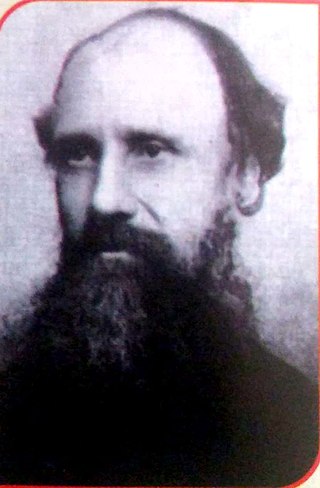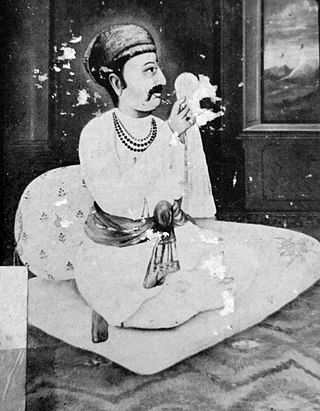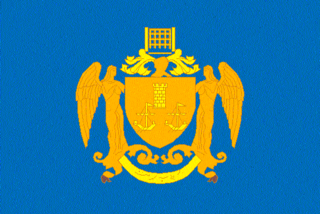Related Research Articles
The British Astronomical Association (BAA) was formed in 1890 as a national body to support the UK's amateur astronomers.

Ranchhodlal Chhotalal, Rai Bahadur was a pioneer of the textile industry in Ahmedabad, Gujarat, India. He is considered as founder of modern Ahmedabad and was also a social activist.

The Gujarat Sultanate, or the Sultanate of Guzerat, was a late medieval Indian kingdom established in the early 15th century in Western India, primarily in the present-day state of Gujarat, India. The kingdom was founded by Muzaffar Shah I who was appointed as Tughlaq governor of Gujarat after the death of his father in 1371. Following Timur's invasion of the Delhi Sultanate, Delhi was devastated and its rule weakened considerably, so he declared himself independent in 1394, and formally established the Sultanate. The next sultan, his grandson Ahmad Shah I moved the capital to Ahmedabad in 1411. His successor Muhammad Shah II subdued most Rajput chieftains. The prosperity of the sultanate reached its zenith during the rule of Mahmud Begada. He also subdued most Gujarati Rajput chieftains and built a navy off the coast of Diu. In 1509, the Portuguese empire wrested Diu from the Sultanate in the Battle of Diu (1509). The Mughal emperor Humayun attacked Gujarat in 1535 and briefly occupied it, during which Bombay, Bassein & Daman would become a Portuguese colony, thereafter Bahadur Shah was killed by the Portuguese while making a deal in 1537. The end of the sultanate came in 1573, when Akbar annexed Sultanate of Guzerat into his empire. The last ruler Muzaffar Shah III was taken a prisoner to Agra. In 1583, he escaped from the prison and with the help of the nobles succeeded to regain the throne for a short period before being defeated by Akbar's minister Abdul Rahim Khan-i-Khanan.
Reverend John Mackenzie Bacon, FRAS was an English astronomer, aeronaut, and lecturer.
The term Gujarati Muslim is usually used to signify an Indian Muslim from the state of Gujarat in western coast of India. Most Gujarati Muslims have Gujarati language as their mother tongue, but some communities such as the Soomra & Sindhi have Kutchi other like Momin Ansari, Memons, Charotar Vahora & Vohra Gujarati Shaikh (Hansotis) and others, have Urdu as their mother tongue. The majority of Gujarati Muslims are Sunni, with a minority of Shi'ite groups.

A total solar eclipse occurred on August 18, 1868, also known as "The King of Siam's eclipse". A solar eclipse occurs when the Moon passes between Earth and the Sun, thereby totally or partly obscuring the image of the Sun for a viewer on Earth. A total solar eclipse occurs when the Moon's apparent diameter is larger than the Sun's, blocking all direct sunlight, turning day into darkness. Totality occurs in a narrow path across Earth's surface, with the partial solar eclipse visible over a surrounding region thousands of kilometres wide.

A total solar eclipse occurred on January 22, 1898. A solar eclipse occurs when the Moon passes between Earth and the Sun, thereby totally or partly obscuring the image of the Sun for a viewer on Earth. A total solar eclipse occurs when the Moon's apparent diameter is larger than the Sun's, blocking all direct sunlight, turning day into darkness. Totality occurs in a narrow path across Earth's surface, with the partial solar eclipse visible over a surrounding region thousands of kilometres wide. It was visible across central Africa, and into India and Asia.

Christianity is professed by 0.5% of the population of the state of Gujarat in India.

Praful Thakkar is an Indian collector of autographs, philately, First Day Covers (FDCs), coins, medals, tokens, badges, badge plates and other collectibles from India. He has written several books on his hobbies.

Rev. Joseph van Someran Taylor, known more commonly as J. V. S. Taylor, was a Scottish Christian missionary and writer of Gujarati language. He made the earliest attempt among westerners at writing a grammar of Gujarati, and also translated the Bible into Gujarati.

Coinage under British governance of the Indian subcontinent can be divided into two periods: East India Company (EIC) issues, pre-1835; and Imperial issues struck under direct authority of the crown. The EIC issues can be further subdivided into two subcategories: the Presidency issues, which comprise separate Madras Presidency, Bombay Presidency, and Bengal Presidency issues; and uniform coinage for all British territories from 1835 to 1858. Imperial issues bear obverse portraits of Queen Victoria, Edward VII, George V, and George VI. No British India coins were issued during the brief reign of Edward VIII.

Shantidas Jhaveri was an Indian jeweller, bullion trader (sarraf) and moneylender (sahukar) during the Mughal era. He was the wealthiest merchant in the Ahmedabad city during the 17th century.

Sir Chinubhai Madhavlal Ranchhodlal, 1st Baronet, also spelled as Sir Chinubhai Madhowlal Runchorelal, commonly known as Sir Chinubhai Baronet, was the first Hindu Baronet of British India, textile mill owner and philanthropist from Ahmedabad, India.

Cambay, Kambay, or Khambhat was a princely state in India during the British Raj. The City of Khambat (Cambay) in present-day Gujarat was its capital. The state was bounded in the north by the Kaira district and in the south by the Gulf of Cambay.
Kavasji Naegamvala, also known as Kavasji Dadabhai Naegamvala (1857-1938) (FRAS) was an astrophysicist and the director of the Takhtasingji Observatory.

Muzaffar Shah I, born Zafar Khan, was the founder of the Muzaffarid dynasty in Medieval India, reigning over the Gujarat Sultanate from 1391 to 1403 and again from 1404 to 1411.
Gujarat, a region in western India, fell under Delhi Sultanate following repeated expeditions under Alauddin Khalji around the end of the 13th century. He ended the rule of Vaghela dynasty under Karna II and established Muslim rule in Gujarat. Soon the Tughluq dynasty came to power in Delhi whose emperor carried out expeditions to quell rebellion in Gujarat and established their firm control over the region by the end of the century. Following Timur's invasion of Delhi, the Delhi Sultanate weakened considerably so that the last Tughluq governor Zafar Khan declared himself independent in 1407 and formally established the Gujarat Sultanate.

Dugald Mackichan FRSE (1851–1932) was a Scottish minister and missionary in India. He was also a physicist. He was Vice Chancellor of the University of Bombay 1888 to 1891 and Mackichan Hall there is named in his honour. He served as Moderator of the General Assembly of the United Free Church of Scotland in 1917.
The Gohil dynasty or Gohil or Guhilas of Saurashtra ruled parts of Saurashtra region of present-day Gujarat state of India as subordinates or independents starting 12th century. Their origin is traced to Guhila dynasty of Gujarat and they had migrated to Saurashtra in 12th century. The earliest known inscription of Gohils is found from Mangrol. They later moved to the east coast where they established themselves and the region came to be known as Gohilwar and ruled till the independence of India in 1947. The erstwhile princely states of Bhavnagar, Palitana, Lathi, Vala and Rajpipla belonged to Gohil rulers.
George Marshall Woodrow was a British botanist who made contribution to the study of plants in Western India, particularly in the Northern Western Ghats. He served as a gardener at Royal Botanical Gardens, Kew, in England from 1865 onward. In 1872 he traveled to India to be in charge of Ganeshkind Experimental Garden at Pune and public gardens of Poona. He worked as a lecturer at R. College of Science Poona in 1879 and was the Director of Botanic Survey of Western India 1893–9. In 1898 he participated in K D Naegamvala's expedition to observe the total solar eclipse of 22 January. He died in Lanarkshire.
References
- ↑ The Indian mission of the Irish Presbyterian Church Rev. Robert Jeffrey - 1890 "George Pritchard Taylor, MA, BD, who, with his wife, a daughter of the late Mr. Wallace, went out for the first time. Mr. George Taylor is son of the Rev. Joseph V. S. Taylor, and was born in Gujarat. To the great joy of his father, ...
- ↑ Sixty years of the Numismatic Society of India, 1910-1971 Numismatic Society of India - 1973 "Dr. George Pritchard Taylor. He was well known to many of us, and beloved by all who knew him. ... He was born in Cambay in 1854 and from 1877 till his death this year lived and worked in and for Gujarat. For nearly 29 years he was Principal of the Stevenson Memorial Divinity College, Ahmadabad. He was a Fellow cf the Bombay University and on the King-Emperor's visit to India received from His Majesty's hands the gold Kaisar-i-Hind Medal.
- ↑ Naegamvala, kavasji Dadabhai (1902). Report On The Total Solar Eclipse Of January 21-22,1898 As Observed At Jeur In Western India.
- ↑ British Astronomical Association, London; Maunder, Edward Walter (1899). The Indian eclipse, 1898; report of the expeditions organized by the British Astronomical Association to observe the total solar eclipse of 1898, January 22. Gerstein - University of Toronto. London Hazell, Watson, and Winey.
- ↑ The Indian economic and social history review: Volume 6 Delhi School of Economics - 1969 "For the dating of the Salim Shahi coins see the article, Geo. P. Taylor on the dates of Salimi coins published in Numismatic Supplement, No"